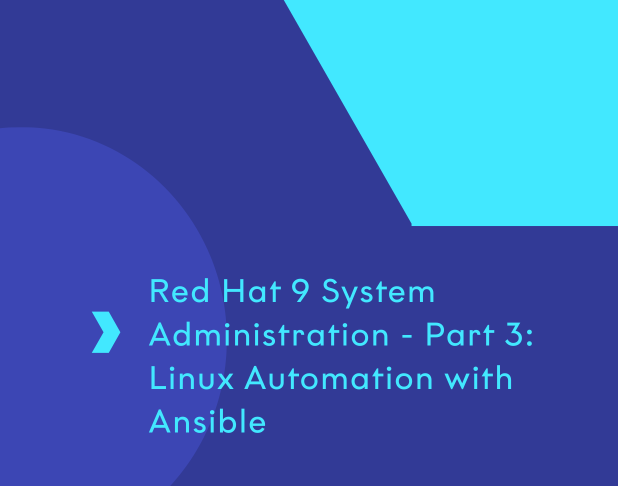This practical course teaches Ansible for Red Hat environments, focusing on powerful automation techniques for enterprise-level Linux system administration and providing the essential skills for streamlined operations.
Red Hat 9 System Administration - Part 3 - Linux Automation with Ansible
Select your learning method

Automate Linux system tasks with practical Ansible training
This four-day course helps experienced administrators advance their Linux automation skills. You’ll focus on applying Ansible in enterprise settings, develop key skills in system orchestration and configuration, and be well positioned to apply these techniques confidently.
- Get started with Ansible fundamentals
- Install and configure Ansible on Linux systems
- Execute and validate ad-hoc tasks
- Write and troubleshoot YAML playbooks
- Use modules to automate system tasks
- Manage variables and gather facts
- Build reusable roles and use Ansible Galaxy
- Encrypt data using Ansible Vault
- Handle errors and implement task retries
- Integrate automation with shell scripting
What you’ll learn
Develop practical expertise in Ansible to automate daily administrative tasks across multiple Linux systems, ensuring consistency and saving time.
System administration tasks text
Automating system admin tasks improves efficiency and reduces human error. This topic covers the use of Ansible modules to manage users, services, firewalls, and scheduled jobs. You’ll learn to apply modules such as 'service', 'firewalld', 'user', 'cron', and 'seboolean'. Special focus is placed on security practices, including SELinux settings and the use of Ansible for enforcing consistent configurations across systems, essential for large-scale IT environments.
Using variables and facts text
Understanding Ansible variables and facts is essential for creating dynamic and reusable playbooks. This section covers how to define and apply simple, list, and dictionary variables. You’ll also discover how to use external variable files and retrieve host facts, then apply them in conditional logic. You'll register task outputs for use in later steps, manage Ansible prompts, and iterate through lists to tailor automation precisely to your needs.
Advanced automation text
Expand your automation capabilities by creating roles and templates. Learn to structure roles using Ansible Galaxy standards and download community roles for faster deployment. You’ll work with Jinja2 templates for dynamic configuration file generation and securely handle sensitive data using Ansible Vault. Finally, integrate Ansible with shell scripts to build robust, reusable automation workflows suited for real enterprise challenges.
- Four days of training in a live virtual classroom
- Hands-on live lab exercises
- Course materials and practical guides
Key facts
Linux system administrators and DevOps engineers looking to automate tasks and standardise processes using Ansible in Red Hat environments.
Completion of Red Hat 9 System Administration – Part 2, or equivalent Linux admin experience, is recommended before attending this course.
Our experienced trainers and interactive labs create a focused, practical environment – so you can put theory into practice from day one.
FAQs
This immersive, practical course explores how to use Ansible for automating tasks across Red Hat systems. You’ll learn to deploy, configure and manage multiple environments efficiently, developing essential skills for modern Linux administration.
What is Ansible Vault and when would I use it?
Ansible Vault encrypts sensitive data like passwords or private keys. You'll use it to ensure secure automation practices.
What’s the difference between ad-hoc commands and playbooks?
Ad-hoc commands are for one-off tasks, while playbooks are used for repeatable and structured automation. Both are covered in detail.
Will I get hands-on experience during the course?
Yes, the course is highly practical with real-time lab environments to apply what you learn immediately.
Is this course suitable for DevOps professionals?
Absolutely. DevOps teams looking to integrate automation into their workflow will find the skills gained here directly applicable.
How is this course aligned with RH294?
The course covers key topics from the RH294 exam syllabus, offering targeted training and real-world skills that support exam preparation.
What our customers say

"I have taken a number of virtual training courses over the years and I have to say this one was the best delivery wise. Stuart was engaging and explanatory, extremely patient and no question seemed unimportant or ridiculous."

"Tarn is an excellent instructor. Everything was clearly communicated. One of the best courses I have attended in recent years."
Join the half a million learners developing their skills with our training
A trusted partner to thousands of organisations worldwide
Our passionate team goes above and beyond to support customer needs
Please complete the form to ensure your quote is accurate and we will contact you soon.